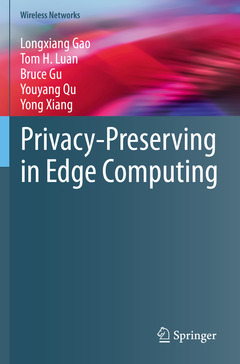Description
Privacy-Preserving in Edge Computing, 1st ed. 2021
Wireless Networks Series
Authors: Gao Longxiang, Luan Tom H., Gu Bruce, Qu Youyang, Xiang Yong
Language: English
Subjects for Privacy-Preserving in Edge Computing:
158.24 €
In Print (Delivery period: 15 days).
Add to cartPublication date: 06-2022
113 p. · 15.5x23.5 cm · Paperback
158.24 €
In Print (Delivery period: 15 days).
Add to cartPublication date: 06-2021
Support: Print on demand
Description
/li>Contents
/li>Biography
/li>Comment
/li>
With the rapid development of big data, it is necessary to transfer the massive data generated by end devices to the cloud under the traditional cloud computing model. However, the delays caused by massive data transmission no longer meet the requirements of various real-time mobile services. Therefore, the emergence of edge computing has been recently developed as a new computing paradigm that can collect and process data at the edge of the network, which brings significant convenience to solving problems such as delay, bandwidth, and off-loading in the traditional cloud computing paradigm. By extending the functions of the cloud to the edge of the network, edge computing provides effective data access control, computation, processing and storage for end devices. Furthermore, edge computing optimizes the seamless connection from the cloud to devices, which is considered the foundation for realizing the interconnection of everything. However, due to the open features of edge computing, such as content awareness, real-time computing and parallel processing, the existing problems of privacy in the edge computing environment have become more prominent. The access to multiple categories and large numbers of devices in edge computing also creates new privacy issues.
In this book, we discuss on the research background and current research process of privacy protection in edge computing. In the first chapter, the state-of-the-art research of edge computing are reviewed. The second chapter discusses the data privacy issue and attack models in edge computing. Three categories of privacy preserving schemes will be further introduced in the following chapters. Chapter three introduces the context-aware privacy preserving scheme. Chapter four further introduces a location-aware differential privacy preserving scheme. Chapter five presents a new blockchain based decentralized privacy preserving in edge computing. Chapter six summarize this monograph and propose future research directions.
In summary, this book introduces the following techniques in edge computing: 1) describe an MDP-based privacy-preserving model to solve context-aware data privacy in the hierarchical edge computing paradigm; 2) describe a SDN based clustering methods to solve the location-aware privacy problems in edge computing; 3) describe a novel blockchain based decentralized privacy-preserving scheme in edge computing. These techniques enable the rapid development of privacy-preserving in edge computing.
Longxiang Gao received his PhD in Computer Science from Deakin University, Australia. He is currently a Senior Lecturer and Deputy Director of Deakin Blockchain Innovation Lab at Deakin University. His research interests include Edge computing, Blockchain, 5G and AI and mobile networks. Dr. Gao has over 80 publications, including patent, monograph, book chapter, journal and conference papers. Some of his publications have been published in the top venue, such as IEEE TMC, IEEE TPDS, IEEE IoTJ, IEEE TDSC, IEEE TVT, IEEE TCSS, IEEE TII and IEEE Access. He has been Chief Investigator (CI) for more than 20 research projects (the total awarded amount is $5.5million), from pure research project to contracted industry research. Dr. Gao is a Senior Member of IEEE and active in IEEE Communication Society. He has served as the TPC co-chair, publicity co-chair, organization chair and TPC member for many international conferences. He is the Associate Editor of IEEE Access and the Assessor of Australian Research Council (ARC) projects.
Tom H Luan received the B.E. degree from the Xi'an Jiaotong University, China, in 2004, the Master degree from the Hong Kong University of Science and Technology, Hong Kong, in 2007, and the Ph.D. degree from the University of Waterloo, Canada, in 2012, all in Electrical and Computer Engineering. During 2013 to 2017, Dr. Luan was a Lecturer in Mobile and Apps at the Deakin University, Australia. Since 2017, he is with the School of Cyber Engineering in Xidian University, China, as a professor. His research mainly focuses on the content distribution and media streaming in vehicular ad hoc networks and peer-to-peer networking, and protocol design and performance evaluation of wireless cloud computing and edge computing. Dr. Luan has published more than 100 technical works and received IEEE VTS 2017 Best Land Transportation Paper Award.
Bruce Gu is currently a Lecturer in the Discipline of Informati




